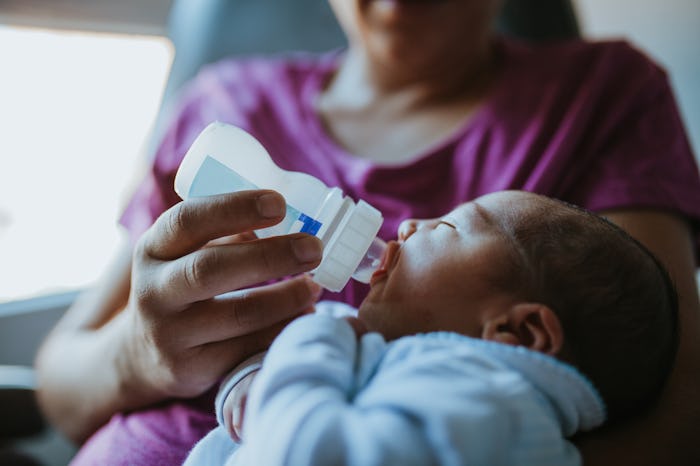Parenting

Amid A Nationwide Shortage, Moms Are Using Social Media To Find Each Other Formula
“I’m looking for Similac Sensitive.” “Has anyone seen Alimentum?” “Desperate to find Enfamil AR.”
A week after the leaked SCOTUS opinion about the upcoming Roe v. Wade decision, my parenting Facebook group starts a thread of mothers looking for formula for their babies. It reads like a roll call: “I’m in Alpharetta, GA.” “I’m in Seattle and can look at Target today.” “I’m in Huntsville, how can I help?” After people list where they are, the requests start coming in: “I’m looking for Similac Sensitive.” “Has anyone seen Alimentum?” “Desperate to find Enfamil AR.” One mom has twins. Another adopted after a long struggle with infertility. One mom had a breast reduction and has always fed her baby with formula, but now wonders if she should have made a different choice. They are scared; stashes are running low. They are worried about how they will feed their babies.
The months after birth are fertile ground for feelings of guilt, of questioning every choice you’ve made for your baby. Breastfeeding or formula? On-demand feeding or scheduled feeding? Cloth or disposable? New parents navigate tongue ties, reflux, and the constant, panicked thought: “Is the baby gaining weight?” It can feel like life or death. When we see headlines about the formula shortage, it is not just a problem on a logistical, supply chain level, not just a health risk for undernourished babies, or an inconvenience for those who can afford to drive around going to Targets all day — it is also a risk to parents’ mental health. The deep fears of the early months of parenting were more than enough before they included the somehow suddenly very real question, “What will I do if I cannot get enough food for my baby?” And, this is also happening during a pandemic. How can these parents, who are genuinely desperate, feel anything but even more alone, even more abandoned?
“I will do everything I can. Every mom wants the same thing for their baby. They must eat.”
In speaking with one mom in my Facebook group, I hear the desperation that so many new parents feel around the ways we feed our children. Kendra has a 3.5-month-old son and lives in New York. She adopted her son and when she got the call from the adoption agency, she received clear instructions on how to prepare to bring home her baby. One direction surprised Kendra. The woman said, “You need to call the hospital now and find out what kind of formula they use, and you need to get as much of it as you can.”
Kendra has been keeping a two-month supply on hand, “enough to feel safe but not to hoard,” but this morning she went online to buy more and panicked. Amazon, Walmart, Target — none of them had any in stock. After work today she drove to six stores and was able to locate a few cans, so he’s OK, for now. She also called her OB-GYN to ask if she should try to induce lactation. Her medical history makes that risky, and the odds of it working out, especially compared to the effort required, are not promising, but “I will do everything I can," she told me. "Every mom wants the same thing for their baby. They must eat.”
As I watch parents turn to their Facebook groups, group texts, and neighborhood email listserv looking for food for their babies, I feel conflicted. When FDA inaction, corporate negligence, greed, and the breakdown of the supply chain have coalesced and created a crisis, it’s true that we can help each other. I heard a story about one mom in California who is weaning her toddler, but has started pumping more so that she can offer her stash to another mom who is desperate to find formula. It’s a beautiful and kind gesture, but one I’m livid she must make.
The generosity in the communities that are rallying to help moms find formula is beautiful. But what does it say about our country? Nothing good.
In the month that we are told women’s bodily autonomy and agency are at risk, in a country where we do not give people the accessible, affordable child care they need, the paid parental leave they need, or the health care they need, where they cannot get the food to feed their babies, it can feel like all we have is each other. But, let me be clear: the generosity in the communities that are rallying to help moms find formula is beautiful. But what does it say about our country? Nothing good.
That is what I want to say to Kendra, to all moms refreshing Amazon, Target, and Walmart online, to those driving from store to store, and especially the ones who can't: “You had a child in a country that routinely, regularly, historically fails parents, and if you didn't know that already, I’m so sorry this is your painful initiation. All we have is each other.”
This article was originally published on